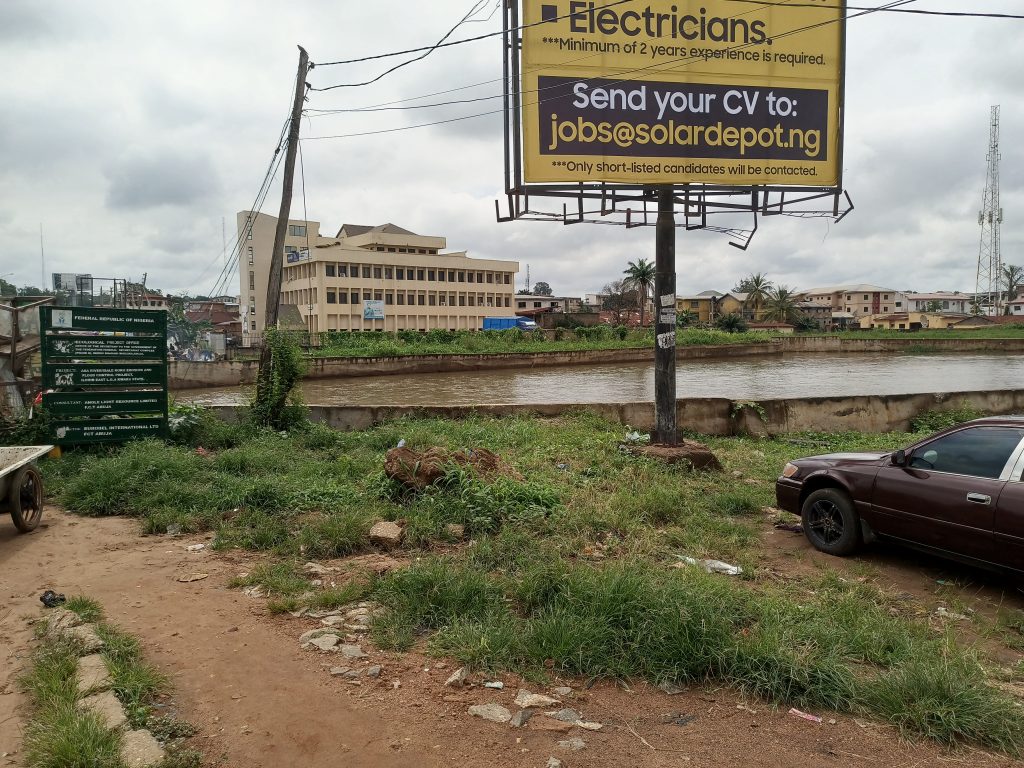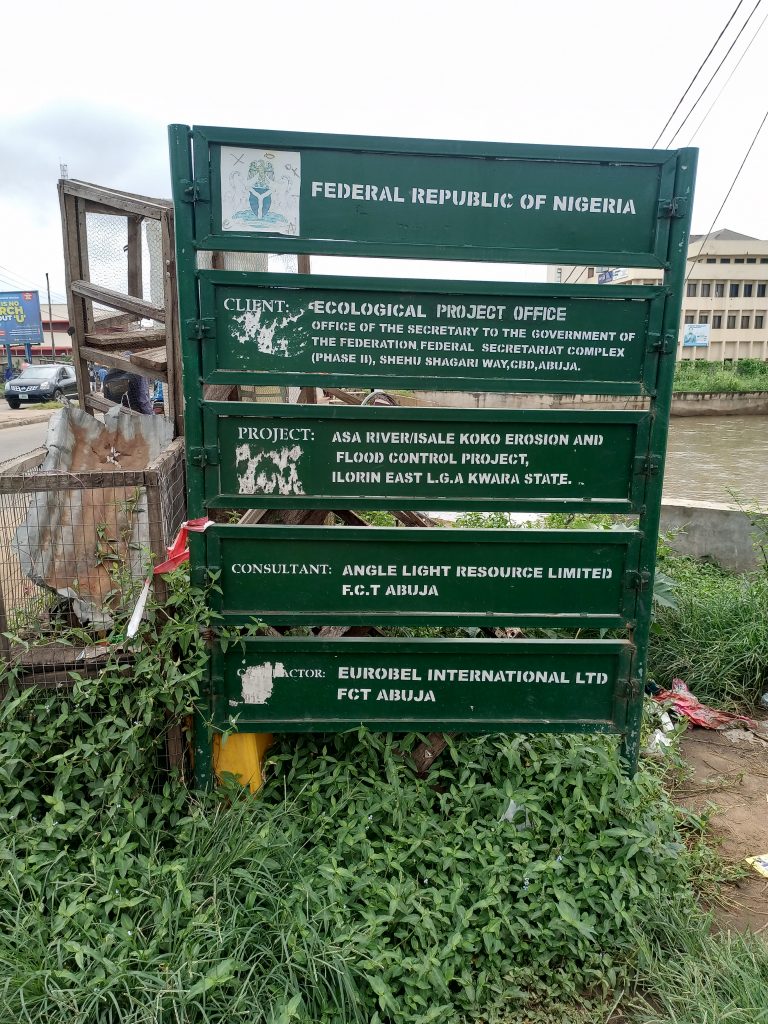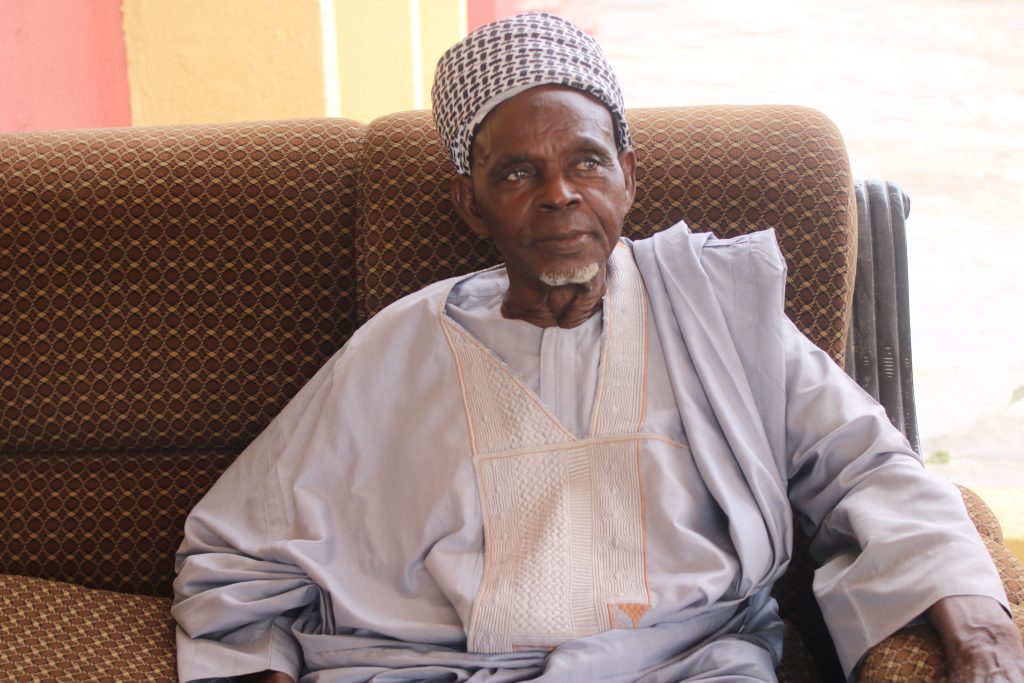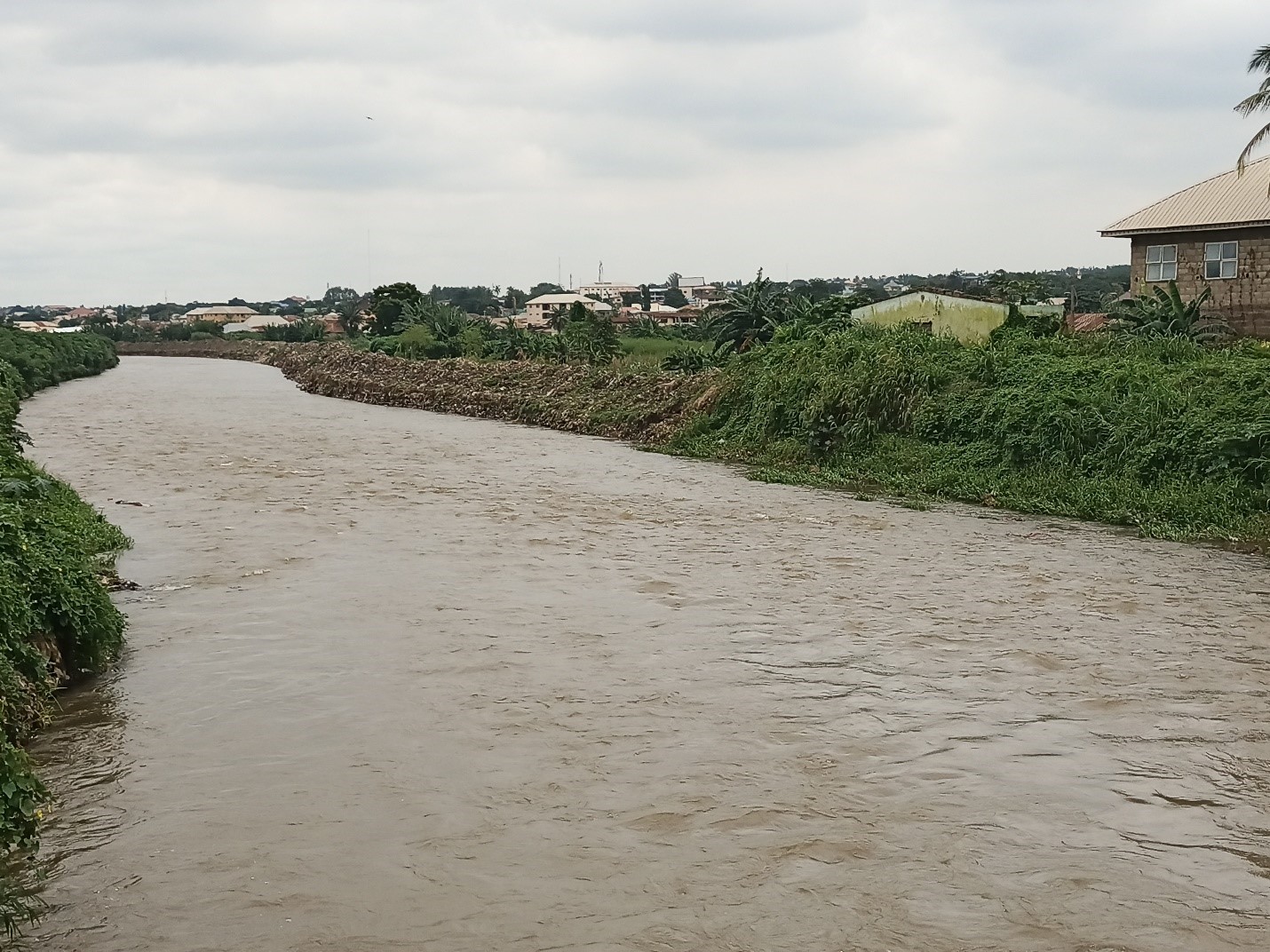In this second part of the report, DARE AKOGUN shows that the Ecological Project Office under the Office of the Secretary to the Government of the federation refuses to account for the N1.1 billion it claims to have spent on ecological problems in Kwara State, while several communities continue to battle flooding and erosion.
Kwara Government Committed to Preventing Flood – Perm Sec
Speaking with our reporter on behalf of the Permanent Secretary Ministry of Environment Kwara State, the Head of Ecology and Conservation Unit, Directorate of Environment, Mr. Ilyas Abdulganiyu, said that the Ecological Project Office is responsible for carrying out ecological projects in any state of the federation.

He, however, stated that the only ongoing ecological project in the state is the dredging and construction of the embankment of the Asa River in the state capital within a clear scope spanning some areas of the river.
According to him “I am not aware of money released to the state, but there are areas prone to ecology problems in the state. In Ilorin, it’s the Asa River that extends from Asa Dam Road down to Harmony Bridge.
“The one they are doing now is from Unity bridge to Harmony bridge, which is the second phase, the first phase was from Unity to Amilegbe which they have completed with concrete embankment,” he said.

He revealed that the only involvement of the ministry is in the area of supervision of the project and nothing more.
“The ministry was informed when the flag was to be done and we were there, so everything about the project is handled by the ecology project office,” he said.
Apart from this project details of other project being executed in the state was shrouded in secrecy as no available information about the project was available.
Abdulganiyu, however, revealed that the state government on its part is carrying out the desilting of drainages and clearing of debris in small rivers and waterways in the Ilorin metropolis as part of its efforts at complementing the work being carried out by the federal government.
“These new areas are Ojatuntun to Ita Amodu and Stadium to Unity Bridge.
“Two separate jobs are being embarked upon at different sections of the large River to arrive at the same solution of preventing flooding and protecting lives and properties,” he said.

When our reporter the sites of the project, it was observed that dredging and embankment were carried out at the unity and post office area of the river, while only dredging was noticed at the Amilegbe axis of the river.
According to the signboard at the site the contract was awarded to EUROBEL International LTD FCT, Abuja, the consultant was Angle Light Resource Limited also in the FCT, while the client is the Ecological Project Office.

Ecological Office Declines Multiple FOI Requests About Project Sites in Kwara State.
With ecological problems ravaging many communities in the state, concerns have been raised over how the Ecological Funds Office has spent the N1.1 billion meant to address exactly this problem.
Investigations into the matter revealed a lack of transparency and accountability in the Ecology Project Office. Multiple requests for information regarding the specific projects undertaken with the allocated funds have been met with silence, leaving citizens and stakeholders in the dark about the progress or completion of the ecology initiatives.
A FOI request was first sent on May 30 to the Ecological Project office requesting for the details of projects executed in the state, including contract description, approved threshold, procurement methods, date of opening bids, and other details. The request was ignored.
A second request was sent on June 26th to the Ecology Project Office but no response till date.
The requests were pursuant to Section 2 (3) and 4 of the Freedom of Information Act 2011, specifically requested for a detailed response on the following;
“The Ecology Project Office total budget for the ecological projects in Kwara state between 2021 and 2022. The total released sum for the Ecological project in Kwara state between 2021 and 2022. The Contract descriptions of ecological projects in Kwara between 2021 and 2022. Dates the projects were advertised in the media, the approved threshold, procurement method, date of bid opening, name of the contractor, date of contract award, contract value, approved budgetary provisions, the amount paid to the contractor so far, and level of project completion.
However, in February 2023 the then Permanent Secretary, of the Ecological Project Office, Shehu Ibrahim, threatened to sanction contractors who fail to meet their contractual agreements and timelines for the completion of their Projects.
Ibrahim said this during an on-the-spot inspection tour of projects in Kwara and Lagos states. Sites visited were Asa River/Isale Koko Erosion and Flood Control Project, Ilorin, Kwara State, where he said that the projects are time-bound because of the seasonal flooding experienced in the country annually.
Speaking at the site of the 4 km Asa River/Isale Koko project and disclosed that the over 20 years of the history of flooding in the area has come to an end with the ecological intervention of the Federal Government through the Ecology Project Office.
According to him, “We are happy that the problems have reduced in the last two to three years when the Federal Government put up measures of erosion and flood control through the project,” adding that the project is positioned to handle the threats posed by the river and its offshoots, causing untold hardship to residents every year.
The major works to be executed under the contract involve dredging and desilting, as well as channelization and construction of retaining walls and drainage channels.
“After the evacuation, desilting, and dredging of the river, people were still dumping refuse in the river. This is something we need to do with the State Government in order to stop the act of dumping refuse in the river and to achieve our goal,” he said.
Malam Ibrahim appealed to residents to maintain the projects so that they can stand the test of time and also admonished them to avoid indecent dumping of debris on the canals which escalates flooding. In addition, he said that the dumped debris will block the waterways, and narrow the river path which prevents the free flow of water from the rivers during the rainy season.
Growing trends of misuse and misappropriation of funds from EPO.
In 1981, the Nigerian Government created the Ecological Project Office (EPO) to address environmental concerns such as erosion, flooding, and landslides amongst other natural or man-made disasters that put human lives and properties at risk across the country.
The EPO receives two percent of Nigeria’s total fiscal budget yearly and does not disclose its annual budget publicly. This is in clear violation of the provision of the Fiscal Responsibility Act, FRA, of 2007, which mandates government agencies to make their budget public.
However, over the past years, there has been a growing trend of misuse and misappropriation of funds from EFO.
An ICIR report shows that projects approved and funded by the Ecological Fund Office from the year 2005 to 2015 were either abandoned, poorly executed, or not done at all.
Within this period, 25 projects approved and funded by EPO in the North Central states of Niger, Nassarawa, Benue, Plateau, Kwara, Kogi and the Federal Capital Territory (FCT), Abuja, cost a total sum of ₦3.7 billion.
It was observed that some of these projects were approved for purposes not relevant to the aims and objectives of the fund.
For example, money was approved by the Federal government on March 4, 2003, through the Ecological Fund account of the Secretary to the Government of the Federation (SGF) for the construction of an abattoir in Bida, Niger State with Lower Niger River Basin Development Authority (LNRBA) as the executing agency.
Also, an audit report by NEITI revealed among others, how the Federal Government led by Goodluck Jonathan, and then Muhammadu Buhari, diverted N93.7 billion meant for the Derivation and Ecology Fund.
Since September 2013, the Nigerian Government has been receiving support from the World Bank to reduce vulnerability to soil erosion, while also carrying out remedial measures in erosion-affected states under the eight-year, $500-million Nigeria Erosion and Watershed Management Project (NEW MAP).
However, these efforts have not reached residents of the community who still long for the government’s intervention.
FEC approves N16bn for erosion control for 12 states and FCT in 2021
The Federal Executive Council on Wednesday approved N16 billion for erosion control in 12 states and the Federal Capital Territory, Abuja.
The special adviser to the president on Media and Publicity, Femi Adesina, made this known when he briefed State House correspondents on the outcome of the Council meeting, chaired by President Muhammadu Buhari.
The presidential aide listed the benefitting states to include Abia, Imo, Ogun, Osun, Cross River, Adamawa, Gombe, Taraba, Jigawa, Katsina, Kwara, Niger and the Federal Capital Territory, Abuja.
“The Ecological Fund projects for the third and fourth quarters of last year were approved. They are soil and pollution control intervention projects.
“These are the projects that were approved – erosion flood control, bridge reconstruction and road improvement at Umonyi-Nkpa communities of Bende Local Government Area of Abia and gully erosion control works at Umukoro lower Okata community in Ihite Ogoma Local Government Area of Imo.
“Imaluomi erosion control project phase II, Ogun State; afforestation combating land degradation road improvement measures in Osun State and erosion control at Calabar Free Trade Zone in Cross River.
“Erosion and road improvement work at Yelwa Private School and Police Station Road, Yola, Adamawa; ecological problems at Federal College of Education (Technical) Gombe; flood and erosion menace affecting the community and environs in Lau Local Government Area phase II in Taraba.
“Others are erosion and flood control at Birnin Kudu-Kafingana, Tsamiya Local Government in Jigawa; flood erosion control works from Kano Road to main water channel in Daura, Katsina State, phase II; Asa River erosion and flood control project at Ilorin in Kwara.
“Erosion flood control and environmental degradation at Agai and Lapai communities in Niger State and finally, soil erosion, river channelization, and slope protection within Maitama District, phase III FCT, Abuja,” he said.
‘House Probe in 2022’
Irked by the lack of accountability which has dogged the management of these funds at almost all tiers of government, the House of Representatives in June 2022, mandated its Committee on Environment to investigate remittances to the Ecological Fund and withdrawals from the account between 2010 and 2022, alleging mismanagement by the beneficiaries.
Specifically, the House mandated the committee to, among other things, “investigate the total consolidated mandatory accruals into the Ecological Fund from 2010 to March 2022,” adding that the committee should equally “evaluate the disbursement of the Ecological Fund in line with the provision of the 1999 Constitution from 2010 to March 2022.”
The committee is also to “investigate the utilization of the Ecological Fund by benefiting government’s departments and agencies (MDAs) from 2010 to March 2022 and establish infractions (if any).”
To establish these facts, the House asked the committee to conduct public hearings with all the major stakeholders on the effective and efficient utilization of the Ecological Fund and report back within six weeks for further legislative action.
The House resolution to probe was a sequel to a motion moved by a member of the House, Femi Bamisile, titled ‘Need to Investigate the Total Consolidation Accrual and Utilisation of Ecological Fund.’
Bamisile had while moving the motion, noted the existence of the Ecological Fund as an intervention fund set up by the Federal Government to address multifarious ecological challenges across the country.
He also noted that the Federal Government, the 36 states of the federation, the 774 local government areas, and the Federal Capital Territory, FCT, receive funds through the Federal Allocation Committee as shares from the Ecological Fund.
The lawmaker stressed that apart from the annual statutory appropriations, four agencies of the Federal Government draw funds from the one percent share of the Federal Government allocated to the Ecology and Derivation Fund, according to their respective enabling laws.
Bamisile stressed that the National Emergency Management Agency, by virtue of Section 13(2) (b) of its Act, draws 20 percent; the National Agency for the Great Green Wall, by virtue of Section 12 (2) (b) of its Act, draws 15 percent; the North East Development Commission, by virtue of Section 14(12) (b) of its Act, draws 10 percent; and the National Agricultural Land Development Authority, by virtue of Section 18 (2) (a) of its Act, draws 10 percent.
“The House is worried that efforts at making beneficiaries of the Ecological Fund accountable for their accrued shared funds in the last few years have been ignored.
“Sections 88 and 89 Constitution of the Federal Republic of Nigeria, 1999 (as amended) empowers the National Assembly to conduct investigation and power as to matters of evidence,” Bamisile said.
Communities Seeks Government Assistance on Relocation
Communities in Edu and Patigi Local Government Areas (LGAs) of the State, the hardest hit have appealed to the state government to relocate them due to the incessant flooding that has ravaged their homes and farmlands.
The communities are Kpata-Gbaradogi, Kpasha, and Chewuru, which are largely agrarian, have been hit hard by the yearly flooding caused by the overflowing of the River Niger and River Kaduna. The floods have destroyed homes, farmlands, and properties, leaving the people with nothing.
Although, the state government had always advised residents leaving in flood prone areas to relocate before the commencement of the rainy season, such advice has always turned deaf ears by the residents partly due to the uncertainty about where to relocate to, and those who are unwilling to relocate from their ancestral homes.
The district head of Likpata and Chewuru Alhaji Manzuma Ndamusa, spoke on behalf of the communities’ saying villages around the river Niger always suffer heavy losses due to the destruction of their farmlands from flooding.

According to him Kpasha, a community about one hour by boat from Lafiagi township in Edu local government area is the most affected as half of the village is underwater and the people can’t leave, this is due to the fact that the land provided for the community to relocate to by the government more than is bare without a single structure.
“The Flood every year always destroys food stuff, farmlands, and live stocks are lost. Most times when the water comes, residents stay on trees for days or makeshift tree houses until help comes.
“We are appealing to the Kwara State Government to come to our aid and relocate us to a safer place. We cannot continue to live in fear every year, not knowing when the next flood will come and destroy our homes and farmlands,” he said.
‘Experts React’
Environmental organizations and concerned citizens have expressed their disappointment at the office’s failure to provide a detailed breakdown of the funds’ utilization.
According to them the refusal to respond to the FOI letter only deepens suspicions of mismanagement and possible embezzlement, as the absence of transparency raises questions about the integrity of the ecological projects in Kwara State.
They warn that failure to utilize the funds as intended could have devastating consequences on the people and the environment in the long run.
The Executive Director of Waterwide Nigeria, Mr. Wilson Atumeyi, said while ecological funds played a critical role in ecological issues, there were still issues of mismanagement and misuse.
“Ecological funds are significant for the country, but we have mismanagement issues around them. Within the same period of 2021 and 2022, we have had serious ecological problems like flooding, and you wonder where N64 billion went because the impact of such huge money was not felt.”
He argued that the lack of accountability not only undermines public trust but also hampers the state’s ability to effectively address environmental challenges. The mismanagement of such a substantial amount of public funds intended for ecological projects further exacerbates the existing environmental issues in Kwara State, which include deforestation, soil erosion, and water pollution.
“It is high time citizens began to ask relevant government agencies how they spend their share of the Ecological Fund”, he said.
The Global Director of Brain Builders Youth Development Initiative with climate volunteers across all LGAs in Kwara Olasupo Abideen expressed concern about the situation.
He said the scale of the problem demands immediate and sustained action from the appropriate authorities.
According to him “These natural disasters disrupt lives, destroy properties, and threaten the livelihoods of countless people. Despite the allocation of substantial ecological funds, the situation on the ground shows that more needs to be done to effectively mitigate and address these issues.
“A few weeks ago, we visited some selected communities in Kwara state to spotlight the challenges they are facing. The stories we encountered were heart-wrenching, highlighting the urgency of the situation.
“While the ecological funds present an opportunity for addressing these environmental challenges, it is imperative that the funds are utilized effectively and transparently.
“The appropriate authorities must be held accountable for the allocation and disbursement of these funds to ensure that they reach the communities in need and are utilized for sustainable and impactful projects,” he said.
He however called on the Kwara state government and relevant federal agencies to take immediate action to address the plight of these communities.
“The situation requires a comprehensive and sustainable approach that includes investments in flood control infrastructure, erosion management, and climate-resilient measures.
I urge the authorities to be transparent in their allocation and utilization of ecological funds. It is essential to involve civil society organizations and community representatives,” he said.
Calls for a thorough investigation into the utilization of the ecology fund have intensified, with demands for those responsible for the mismanagement, if any, to be held accountable. Transparency and accountability in the handling of public funds are crucial for sustainable development and the preservation of the environment.
This investigation is supported by the John D. and Catherine T. MacArthur Foundation and the International Centre for Investigative Reporting.

